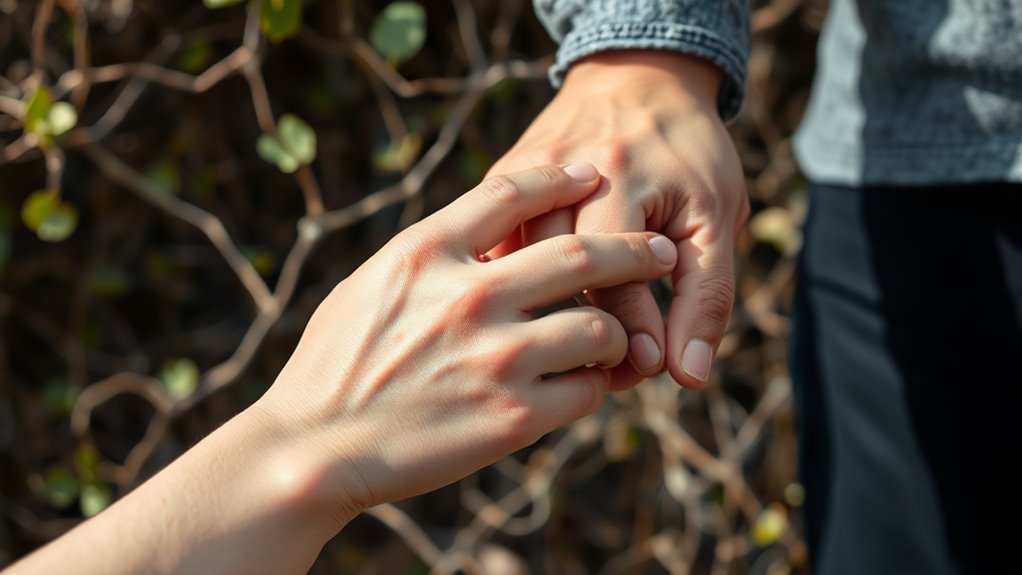You might find yourself struggling between codependency and love addiction, as both involve unhealthy emotional dependencies but have different roots—codependency centers on prioritizing your partner’s needs, while love addiction seeks constant validation and highs. Recognizing the overlap helps you establish boundaries, focus on your needs, and rebuild self-esteem. By understanding these patterns better, you can start healing and creating healthier relationships—if you continue exploring, you’ll discover effective strategies to break free and regain your independence.
Key Takeaways
- Both involve unhealthy emotional dependencies, but codependency centers on partner’s needs, while love addiction seeks emotional highs.
- Overlap occurs when boundary-sacrificing stems from either the need to be needed or fear of loneliness.
- Establishing clear boundaries and prioritizing personal needs are essential for recovery from both patterns.
- Self-awareness and developing self-esteem independent of relationships help break these dependency cycles.
- Therapy and support groups aid in identifying root causes and adopting tailored healing strategies.

Understanding the differences between codependency and love addiction is essential because, while both involve unhealthy relationship patterns, they stem from distinct emotional needs and behaviors. Recognizing these differences can help you better understand your own patterns and take steps toward healthier relationships. Codependency often involves an excessive reliance on your partner’s approval and validation. You might prioritize their needs over your own, feeling responsible for their happiness and well-being. This behavior often develops from a desire to feel needed or to avoid abandonment. You might find yourself constantly sacrificing your wants and needs to maintain the relationship or prevent conflict. Over time, this can lead to a loss of your identity, where your self-worth becomes tied solely to how well you’re supporting or pleasing your partner.
In contrast, love addiction revolves around an obsessive need for love and validation from others. You might chase romantic relationships to fill a void or escape feelings of loneliness or low self-esteem. Love addicts often experience intense cravings for connection, sometimes engaging in risky or unhealthy behaviors to secure a partner’s affection. The obsession can make it difficult to be alone or to recognize when a relationship is unhealthy. Unlike codependency, which is rooted in caretaking and responsibility, love addiction emphasizes craving emotional highs and avoiding emotional lows, often driven by a fear of abandonment or feelings of inadequacy. This dependency can cause you to stay in toxic relationships because the addiction to the “high” of being loved outweighs the recognition of real, healthy connection. Additionally, understanding the role of emotional regulation can be crucial in overcoming these patterns.
Both patterns can overlap, making it tricky to distinguish between them. For example, you might find yourself sacrificing your boundaries in a relationship out of a desire to be needed (a codependent trait) or to avoid feeling lonely (a love addiction trait). Establishing boundaries is pivotal in breaking free from these unhealthy patterns. You need to learn to prioritize your needs without guilt, recognizing that healthy relationships are based on mutual respect rather than dependency. Recovery involves gaining self-awareness about your emotional needs and developing self-esteem independent of your relationship status. Therapy, support groups, and self-reflection can help you identify the root causes of these behaviors. Ultimately, understanding whether you’re struggling more with codependency or love addiction allows you to adopt tailored strategies for healing, fostering healthier, more balanced relationships in the future.
Frequently Asked Questions
Can Someone Experience Both Codependency and Love Addiction Simultaneously?
Yes, you can experience both at the same time. You might find yourself overly dependent on others for validation and feel compulsively drawn to love, even when it’s unhealthy. These patterns often overlap because they stem from similar emotional needs. Recognizing this is the first step. You can work on setting boundaries and seeking support to break free from these cycles and build healthier relationships.
How Do Childhood Experiences Influence Codependency and Love Addiction?
Your childhood experiences deeply influence your tendencies toward both codependency and love addiction. If you grew up feeling neglected or overly responsible for others, you might seek validation through relationships, fearing abandonment or rejection. Early trauma or inconsistent caregiving can lead you to prioritize others’ needs over your own, creating patterns of dependency. Recognizing these roots helps you understand your behaviors and empowers you to build healthier boundaries and relationships.
Are There Specific Personality Traits Linked to These Behaviors?
You might find that certain personality traits seem to scream, “This is me!” like extreme clinginess, perfectionism, or a desperate need for approval. These traits can make you feel like you’re on an emotional rollercoaster, constantly craving connection while fearing abandonment. Recognizing these traits helps you understand your behaviors better, giving you the power to set boundaries, heal, and build healthier relationships, breaking free from the cycle.
What Role Does Self-Esteem Play in Recovery From Both Conditions?
Self-esteem plays a vital role in your recovery from both conditions. When you build your self-worth, you become less reliant on others for validation and emotional stability. Improving your self-esteem helps you set healthy boundaries, resist enabling behaviors, and foster independence. As you develop a positive self-view, you’ll find it easier to break free from patterns of codependency or love addiction, empowering you to create healthier relationships and a more balanced life.
Can Couples Recover Together From Codependency or Love Addiction?
Yes, couples can recover together from codependency or love addiction if they’re both committed to change. You need open communication, mutual support, and individual therapy to address underlying issues. Setting healthy boundaries and focusing on personal growth help rebuild trust and independence. Recovery isn’t easy, but with patience and cooperation, you can create a balanced relationship where both partners feel secure and valued.
Conclusion
So, whether you’re stuck in the tangled web of codependency or just love the thrill of chaos, remember: boundaries are your best friend, not your enemy. Trying to differentiate between real love and addiction is like trying to find a needle in a haystack—except the haystack is made of emotional landmines. But hey, at least now you know the difference. Now go ahead, break free, and maybe—just maybe—find love that’s healthier than a Netflix binge.









